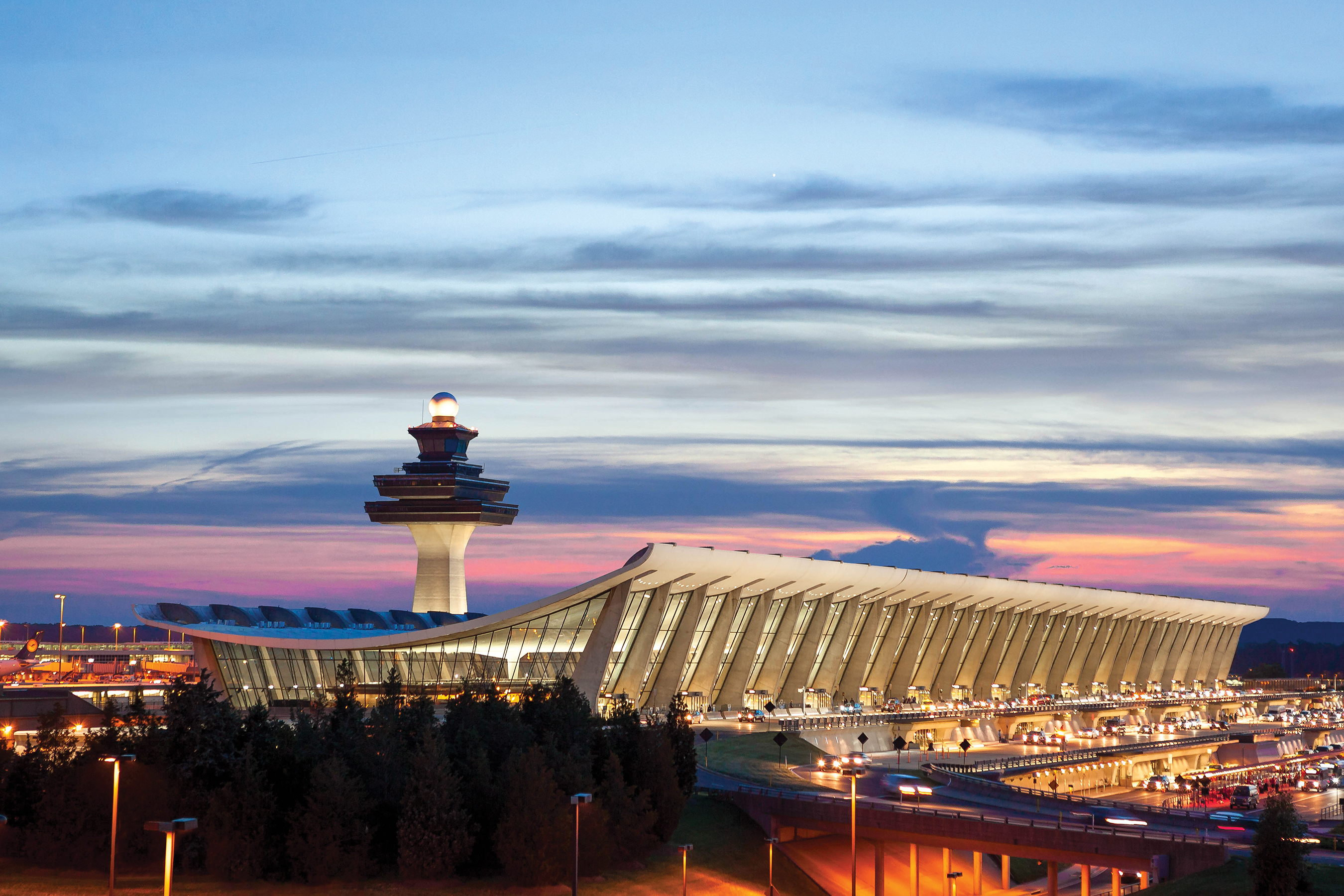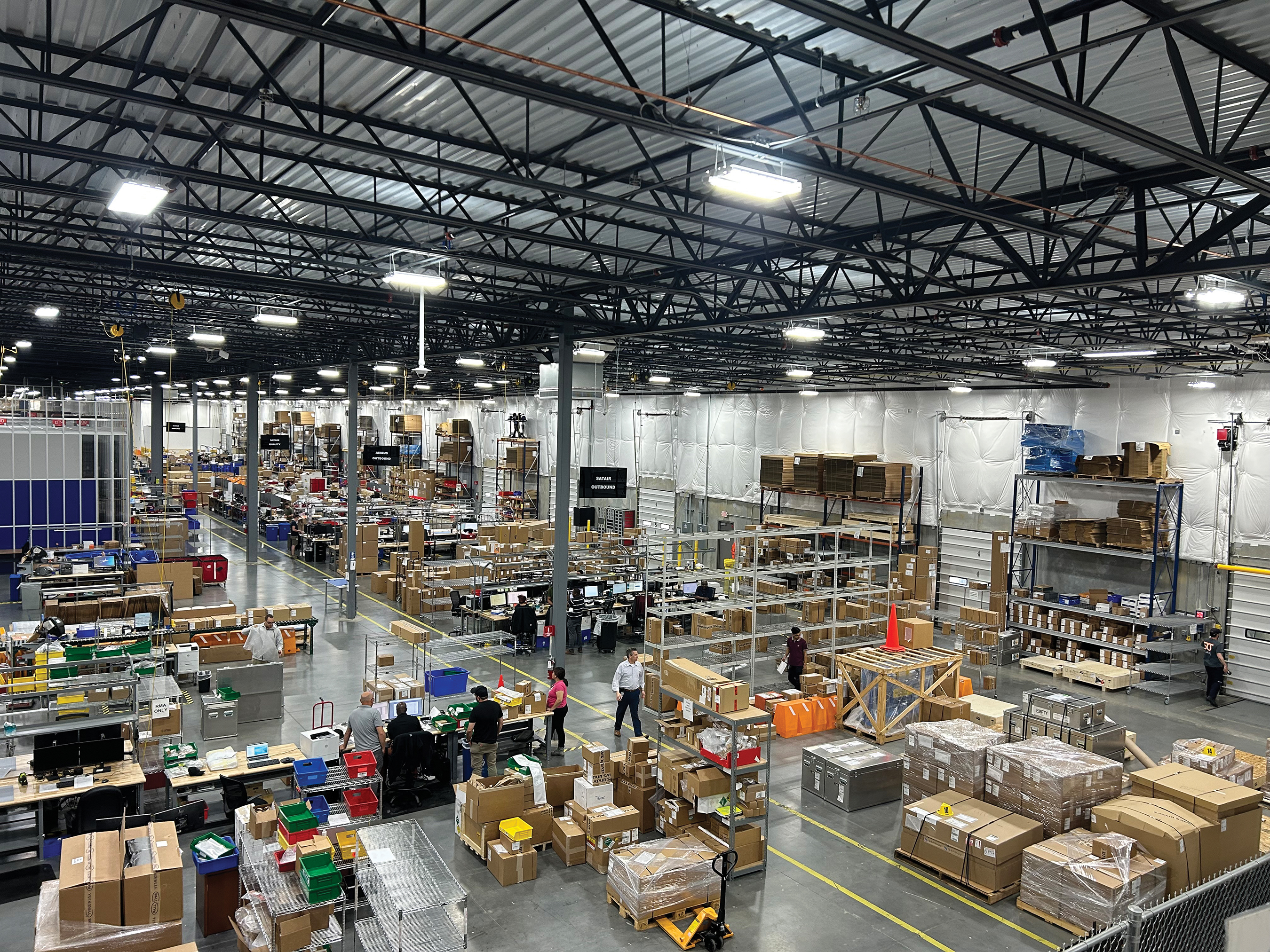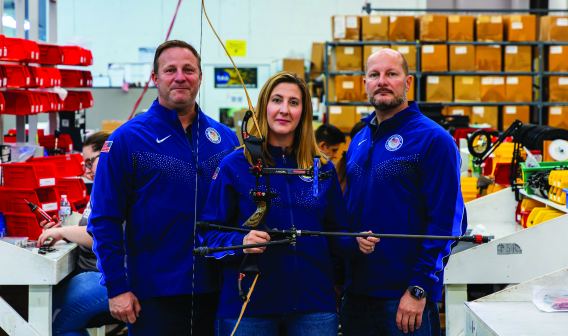Infrastructure Excellence Draws International Investment
Global companies cite Washington Dulles International Airport and The Port of Virginia as key factors in success
How much does Dutch aviation and aerospace giant Airbus value Washington Dulles International Airport? Enough to pick nearby Loudoun County as a center of its U.S.-based spare parts distribution operations not once, but twice.
In 1990, Airbus North American Holdings bought 13 acres in Beaumeade Corporate Park in Ashburn for its new customer service and parts center.
The choice to land near Dulles was an easy one. It’s a large international airport for passengers and freight, it’s close to the nation’s capital, and it’s a robust place for aerospace companies, both for commercial and military use. And Airbus’ U.S. headquarters are nearby, in the town of Herndon in Fairfax County.

Washington Dulles International Airport, Fairfax and Loudoun counties
Those connections even came with a low cost because land was cheap in a region that was mostly farmland at the time.
“Loudoun County, with Dulles being an international airport, was the perfect place to build that facility,” said David Kelley, head of operations in the Americas for Airbus subsidiary Satair, founded in Denmark in 1957 and bought by Airbus in 2011.
Twenty-nine years later, Satair, one of the largest distributors in the world for aerospace parts, surveyed America and chose again to be close to Dulles, leasing property in Northwoods Industrial Park in Loudoun County.
It did so even though massive development over the years has markedly increased land prices since the county’s farm days.
“We looked at talent and resources in the region. We looked at freight routes and international airports and [concluded] that Loudoun County was the best place to do business,” Kelley said.
In February, U.S. Secretary of Transportation Pete Buttigieg announced that Dulles and Norfolk International Airport would receive federal grants to upgrade terminal facilities. Dulles will receive $35 million to construct a new 14-gate terminal, while Norfolk will receive $6 million for the construction of a new Federal Inspection Service facility to process cargo and agricultural products.
The draw of Dulles is matched by the pull of The Port of Virginia, creating bookends of infrastructure that have made the Commonwealth a magnet for investment and business.
A Hub of U.S. Infrastructure
Dulles opened 26 miles west of Washington, D.C., in 1962, with the choice made four years earlier by an American president who knew the important intersection of land and strategy: Dwight D. Eisenhower. By the start of this century, the airport was one of the fastest-growing in the world and a gateway to America’s East Coast.
In December 2023 alone, 21,171 passenger flights took off or landed, and Dulles was on pace last year to carry about 24 million passengers, while on the cargo side, the airport flew more than 300,000 tons to 57 international and 86 domestic destinations.
Some of those passengers and cargo came courtesy of Hanley Energy, a multinational company founded in Ireland that has quickly grown thanks to its focus on helping companies, including power-hungry data centers, use energy more efficiently.
“We had learned from a number of other offices we’d opened around the world that were much greater travel and distances from airports and infrastructure that it really made it very difficult, when you were flying in, to be effective,” said Hanley CEO Clive Gilmore. “We were 10–15 minutes from [Dulles]. That was the first criteria for the office.”
Dulles has helped make the region the biggest for data centers in the world, larger than all of Europe combined, and the computers that drive those centers must be kept cool, requiring a massive amount of energy.
The rapid build-up of data centers and other commerce and industry has made the area close to Dulles a draw for human expertise, which Hanley expects to tap with ambitious growth plans — the number of employees has already grown from two in 2018 to more than 300.
“No matter what kind of expertise you needed, if it was land, renting, legal, or transportation, somebody was always there to help answer the question,” he said.
The emergence of data-hungry artificial intelligence and machine learning will only accelerate Hanley’s growth, so it was critical for the company to be close to an airport that could accommodate that growth.
Last year, Hanley opened a 40,000-sq.-ft. office that is 20 times larger than the property it first leased in Virginia. Experts from its operations in Ireland regularly travel to Virginia to help with key tasks, so being close to Dulles makes those trips seamless, Gilmore said.
To make sure the company makes best use of Dulles and other resources in the region, officials from Loudoun and Fairfax counties regularly engage with Hanley.

Satair Outbound Shipping Area, Fairfax and Loudoun Counties
Seamless access to Dulles was also what propelled Satair to set up shop a second time near the airport. In recent years, customers have come to expect just-in-time delivery, and Dulles helps make that possible. “It’s the expectation now. And so you need to have that reliability and timeliness,” Kelley said.
Satair invested $10 million in its new Northwoods facility, which has 250,000 square feet of space, to provide parts and support to clients that include Delta Airlines, American Airlines, United Airlines, and Air Canada, as well as major maintenance repair organizations like Aeroman in El Salvador and HAECO Americas in North Carolina.
“A plane is only as safe and reliable as the parts that go into it,” Kelley said.
The Value of Reliability at The Port of Virginia
Reliability has also been a hallmark of The Port of Virginia, according to businesses that depend upon it.
“The ports are vital to our business,” said Massimo Zanetti Beverage USA (MZB) Chief Financial Officer John Phifer. He said the company otherwise “couldn’t run a business of our scope and scale...That was a vital part of the decision to expand.”
In 2021, MZB built a state-of-the art distribution facility in Suffolk, a 350,000-sq.-ft. space in the Equus Capital Partners Virginia Port Logistics Park off U.S. Route 58 that will fuel further growth in a company that first came to Suffolk 36 years earlier.
The coffee company, founded in Treviso, Italy, moves about 6,000 shipping containers annually through the port. Even when the COVID-19 pandemic disrupted supply lines around the world, the port stood out by keeping operations going when other ports lagged.
“They’re very efficient in moving cargo through the port,” Phifer said. “It doesn’t get hung up there. I think about the issues they had on the West Coast during COVID. I don’t think we had nearly the issues with the traffic through the ports on the East Coast, and particularly in Norfolk.”
With ongoing dredging to create and maintain the deepest, widest channels on the East Coast, the port hits the geographical bullseye for MZB — it’s an easy trip for coffee suppliers from Central and South America, he said.
Plans to expand the road network to and near the port’s Hampton Roads facilities — the Virginia Port Authority also operates Richmond Marine Terminal on the James River and the Virginia Inland Port in Warren County in the Northern Shenandoah Valley — will provide a further boost to the company’s bottom line, including the addition of a third lane in each direction on Interstate 64 and expansion of the Hampton Roads Bridge-Tunnel.
“That’s a significant improvement over what that corridor looked like 10 years ago. That connection and growth expand the bandwidth the company will have to deliver products to a large base of customers in the Northeast,” Phifer said.
The added capacity helps MZB continue to grow its product lines to keep pace with trends among coffee drinkers, such as the growing appetite for espresso, certified coffees, single-serve, and other formats of coffee, he said.
Port-Driven Efficiencies Enable STIHL's Growth
The Port of Virginia has helped another area company diversify its products to meet the changing demands among consumers: STIHL Inc., which has called Virginia Beach home since 1974.
Back then, STIHL made chainsaws, trimmers, and other equipment powered by gas. But in more recent years, there has been a surge in demand for battery-powered equipment — and the port has helped the company keep pace.
A location less than 30 minutes away from the port has helped the company lower transportation costs so the company can focus its spending on growing its business, said Michael Ward, the company’s director of supply chain. “We’ve been able to really save a tremendous amount of money both in freight and efficiency and deliver our product to our customers in a much faster manner,” he said.
[The Port of Virginia has] been very consistent throughout the whole pandemic with their performance. They’re also extremely good with their communication if there are delays. The fact that they’re so reliable means we can focus on other things that need to be improved within our own walls.
STIHL exports about 3,000 shipping containers a year, the majority destined for Europe using ports in Bremerhaven on Germany’s North Sea coast and Antwerp on Belgium’s Scheldt River.
The company imports about 4,000 containers annually, nearly two-thirds of them finished goods and the rest raw products.
STIHL operates within a U.S. Customs and Border Protection-designated Foreign Trade Zone (FTZ), where companies can use special procedures that help encourage trade activity by allowing delayed or reduced duty payments on foreign merchandise, along with streamlined Customs procedures and other benefits. Dulles also serves as the hub of a separate FTZ, and four other zones operate in Virginia, based in Culpeper County, Richmond, Southwest Virginia, and the New River Valley.
In addition to those benefits, STIHL benefits from the port’s efficient, reliable operations, which create savings STIHL uses to improve its own products and operations — even during the pandemic.
“They’ve been very consistent throughout the whole pandemic with their performance. They’re also extremely good with their communication if there are delays,” Ward said. “The fact that they’re so reliable means we can focus on other things that need to be improved within our own walls.”
Those gains in efficiency helped the Virginia Beach facility be selected to make new guide bars locally rather than importing them, as well as allowing STIHL to manufacture their battery packs in Virginia Beach instead of producing them overseas.
Said Ward, “They’ve been a very good partner in helping us become more cost-effective and reliable ourselves, fast to the market and sending product to our customers.”




